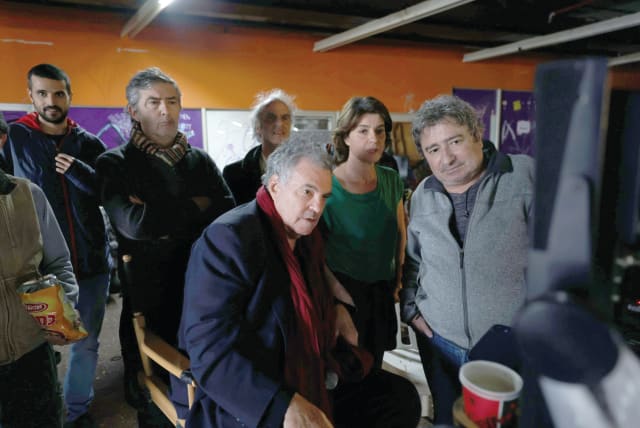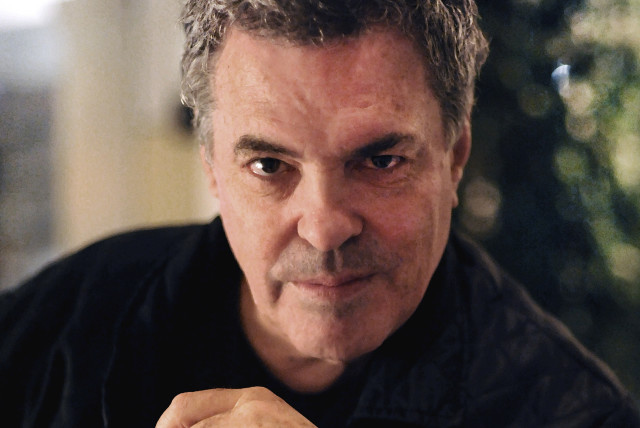Amos Gitai's new film 'Shikun' reflects current situation in Israel

Shikun (Hebrew for housing project), which was received enthusiastically by the Berlin audience, is Gitai’s 67th film
They love Amos Gitai in France, and also in Berlin, where Shikun, his latest film, had its world premiere at the Berlinale, the Berlin International Film Festival, in February. The movie opened in theaters throughout Israel on March 7.
Shikun (Hebrew for housing project), which was received enthusiastically by the Berlin audience, is Gitai’s 67th film (the number includes several short movies) in a career in which he has been showered with awards, including from the most prestigious film festivals, such as Cannes and Venice. A number of top European and American actors have appeared in his movies, including Natalie Portman, Juliette Binoche, and Jeanne Moreau, and in Shikun, French actress Irene Jacob has a central role.
Shikun is a plotless movie set in a Beersheba housing project that uses a very loose adaptation of Ionesco’s theater of the absurd classic, Rhinoceros, to critique Israel’s ills. It opens with Jacob walking through the concrete corridors of the project, speaking in French about “being trapped by violent events” and revealing that she has started glimpsing rhinos. As she walks, she passes a cross-section of Israelis, including corrupt and cynical real-estate developers; Ukrainian refugees and workers from India learning Hebrew; a Holocaust survivor recounting his memories of a death march; a silent Arab woman on a scooter, who makes a rhino’s horn for herself out of fabric; ultra-Orthodox who discuss the need for divine intervention; a Hebrew-language teacher and a young Arab man who kiss; a librarian (Hana Laslo, who appeared in Gitai’s 2005 Free Zone and who won the Best Actress Award at Cannes for that performance) who has created a makeshift library in a deserted corner of the building; the marching band of an Israeli youth group, playing “Amazing Grace,” and many other types you really might find in such a building.
In a roundtable interview with journalists in Berlin, Gitai addressed the elephant – rather than the rhino – in the room and spoke about the October 7 Hamas massacre and the subsequent outbreak of war. Shikun had not been re-edited to reflect the current situation, he said. “The truth is, I was hesitating. The producers thought I could add an epilogue, but I thought it would be a bit kitsch when I looked at it again.” He chose not to make use of “such a tragic, monumental event and I didn’t go to see the tourist guides [to the sites] in the burned kibbutzim. I think that we should keep the dignity and the sadness of this event authentic.”
Gitai 'encouraged by warm welcome of the Berlinale director'
WHILE THERE have been calls for some cultural events around the world to boycott Israeli creators following the beginning of the war, “I was encouraged by the warm welcome of the director of the Berlinale, whom I respect, and I said, ‘This is the film.’ Anyway, I would not adapt the film, Kippur [his 1999 movie about the Yom Kippur War] for today, nor the film about the killing of Rabin [his 2015 film, Rabin, the Last Day], I think they should stay what they are... I’m at peace with this piece.”
He spoke critically of the government of Prime Minister Benjamin Netanyahu and his proposed judicial reforms, which was part of what inspired him to make Shikun, calling the prime minister “cultivated and dangerous.” Gitai said that he felt that the role of art and culture was particularly important in Israel right now, praising the anti-judicial reform protest movement. “We will not put up a white flag, we will try to defend the Israel we love, which is threatened by Netanyahu and... the worst elements of Israeli society, the racist, ultra-religious, and if we let them continue, they will destroy the Israeli project,” he said.
He noted that many countries around the world had seen a similar rise of the Right in recent years and that the stakes were high in Israel, “Let’s not forget, Israel is also surrounded by an unfriendly environment, it is a dangerous region... I’m critical of Israel, but I’m not hostile to Israel, I know why it exists. There is a good reason to allow the Jews to have a piece of land on this beautiful planet.”
He added that he was appalled by the “terrible savagery, [and] rape” of the October 7 attacks against Israelis, “many of whom were people who wanted peace” and that “because I like to individualize stories” he was especially affected by the murder of Vivian Silver, a peace activist who helped Gazans receive medical treatment in Israel.
“I don’t want to hear about national liberation, there is no justification for these acts. Nothing. And at the same time, there is no victory. What is the image of victory? There is only death and destruction.” He said that Hamas “had won in a knockout” by putting the Palestinian issue back on the world agenda.
Following October 7, “I didn’t feel like doing a documentary,” but he felt that Shikun was especially relevant because “the film is kind of a metaphor... It’s not naturalistic cinema that with the capitalist dictatorship of Netflix that’s what people want, I’m not interested in it... I only do the films I want to do. After I crawled out from my helicopter which was shot [down] by the Syrians 50 years ago [when he fought in the Yom Kippur War], I said to myself... now I will do what I want, I will say what I want, and that’s it.”
HE SAID that he was inspired to adapt Ionesco because of “his irony.” He spoke to Ionesco’s daughter about how Rhinoceros is “against fascism and Stalinism,” and said she told him that her father had been aware that Hebrew is the only language that took the word, “rhinoceros” and made it into a verb, “le-hit-kar-nef,” meaning to become a rhino.
The actors were instrumental in the development of the script, he said. “I like to work with actors as interpreters.” He started the process by sending Ionesco’s play to Jacob: “She is a great intellectual, with simple, beautiful elegance, who is creative.” He invited her to select passages she would like to be included in the film. As he and Jacob worked on House, a theater piece based on his first documentary, he added a number of actors to the cast, among them Menashe Noy, Laslo, Yael Abecassis, and Bahira Ablassi. While most of the text of the film was inspired by Ionesco, he said there were lines in the script by Umberto Eco, Amira Hass, Robert Musil, and Mahmoud Darwish.
Jacob also met with reporters and spoke about working on the film. “We didn’t know how to do it,” she said. “It was a process where we were imagining this. For me, this part was allowing so much. It’s not a normal, regular part. It’s completely poetic, full of wildness, full of poetry, full of contradictions, I really loved this. It was wonderful to have this freedom in acting.” While she spoke French throughout the film, she noted that other actors spoke Hebrew, Arabic, Yiddish, and Ukrainian, sometimes in the same scene. “It’s all these voices together... It’s like a dream, the film.”
Gitai said, “I like cinema that makes you work, to try to figure out what this person wants to tell me,” he said. He mentioned some directors who inspire him, such as Roberto Rossellini, Jean-Luc Godard, Pier Paolo Pasolini, and Robert Bresson. “I’ve often said that the best films [I’ve seen in my] life start when the screening is over. You have to stress your brain and try to figure it out and then it stays with you, you’re figuring out the puzzle.”
Jerusalem Post Store
`; document.getElementById("linkPremium").innerHTML = cont; var divWithLink = document.getElementById("premium-link"); if (divWithLink !== null && divWithLink !== 'undefined') { divWithLink.style.border = "solid 1px #cb0f3e"; divWithLink.style.textAlign = "center"; divWithLink.style.marginBottom = "15px"; divWithLink.style.marginTop = "15px"; divWithLink.style.width = "100%"; divWithLink.style.backgroundColor = "#122952"; divWithLink.style.color = "#ffffff"; divWithLink.style.lineHeight = "1.5"; } } (function (v, i) { });

